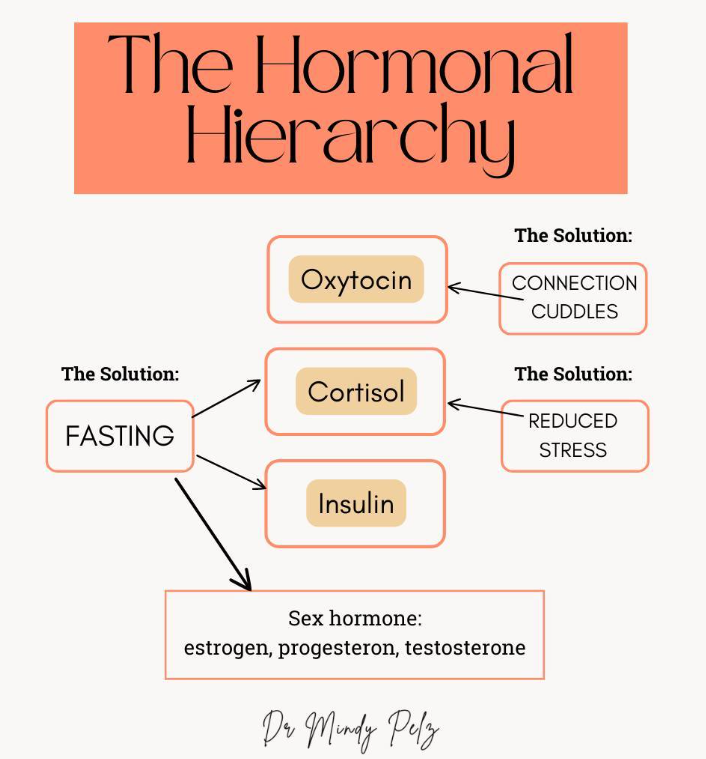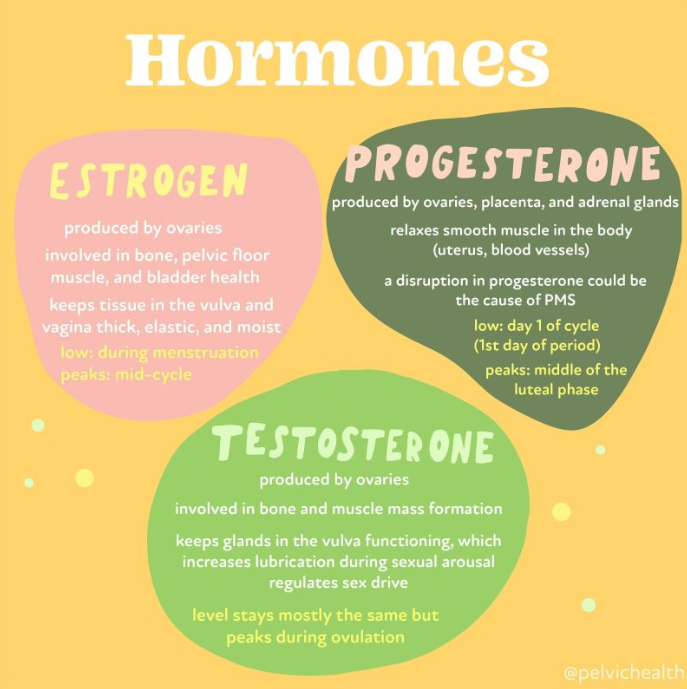Your days are jam-packed but you struggle with concentrating, mood swings and increased anxiety. At night, your sleep is disturbed with hot flashes, night sweats and ruminating. And if these aren’t enough, you’re gaining weight, your hair is thinning, and your skin is dry. What if I told you that these are symptoms of hormone imbalances that lifestyle changes can improve? There are 6 hormones in the hormonal hierarchy that have a significant influence on your health and wellness. Are you ready to learn about the 3 hormones that influence your 3 sex hormones? I also give you an extensive set of lifestyle changes that empower you to naturally balance your hormones.

The Hormonal Hierarchy
The hormonal hierarchy shows six primary hormones that influence a woman’s health. It helps us understand that certain hormones have more power over others. As you can see, if you want to influence sex hormones, you need to work on the hormones that are higher – oxytocin, cortisol, and insulin. So let’s dive into these three hormones.
Oxytocin
Oxytocin is at the top of the hormone hierarchy and, therefore, the most influential hormone. It’s known as the “cuddle hormone” or the “love hormone,” because it’s released when people snuggle up or bond socially. When you boost oxytocin, it calms cortisol and has a positive effect down the hormonal line, leading to improved sex hormones. Amazing, right?
Cortisol
Cortisol is often called “the stress hormone”. High cortisol levels are characteristic of the typical “rushing woman”. Cortisol spikes when stress levels go up. A surge of cortisol signals to your body to elevate your blood sugar to give you energy for your fight-or-flight response. Basically, your body prepares to run away from the threat, releasing stored sugar to send to your muscles quickly so you can act. Your body adapts to this new surge of blood sugar by telling your pancreas to make more insulin. This is why stress will work against you if you’re trying to lose weight. Cortisol can raise insulin as much as a piece of cake can. And, these surges in insulin affect our sex hormones. The bottom line is that cortisol is the enemy of weight loss and depletes sex hormone production.
Insulin
Third in the hormonal hierarchy is insulin. Insulin is a crucial hormone produced by the pancreas that helps regulate blood sugar levels. When you eat, your body breaks down carbohydrates into glucose, which enters the bloodstream. Insulin allows cells to absorb this glucose to be used for energy or stored for future use. Insulin is not able to deliver all of the glucose into the cells when we eat sugary foods, ultra-processed foods, and man-made carbs. When this happens, insulin will store the extra glucose in other parts of the body starting with fat, muscle, and liver. Maintaining balanced insulin levels is essential for preventing insulin resistance, managing weight, and reducing the risk of conditions like type 2 diabetes as well as balancing of sex hormones.

Three Sex Hormones
Now we finally get to our three sex hormones. They’re at the bottom of the hierarchy because they can be dramatically influenced by oxytocin, cortisol, and insulin. During a woman’s menstrual cycle, her sex hormones – estrogen, testosterone, and progesterone – fluctuate throughout the course of a month or so. Each sex hormone affects us in a different way and has things that help them build and things that deplete them. This section reviews the personality of each sex hormone and how to properly tend to it to balance your hormones. If you don’t have a cycle or are post menopausal, your hormones still have neurochemical needs in order to thrive.
Estrogen
Timing: Starts building on day 1 of cycle (first day of bleed) / Peaks between days 10 and 15 / Decreases for remainder of cycle.
Personality: Extrovert
Effects:
- Stimulates collagen production, promotes healthy skin and hair, strong bones, elastic ligaments
- Precursor to neurotransmitters (serotonin, dopamine, noradrenaline, acetylcholine) associated with good mood, clarity of thought, enhanced communication, optimism, better ability to handle stress, increased memory
- Secretes BDNF, glutamate, and oxytocin associated with greater ability to hold on to new information, as well as enhanced feelings of connection
Preferred Lifestyle:
- Okay with higher levels of stress
- Likes low insulin and glucose
Symptoms if out of balance:
- Hot flashes (during perimenopause and menopause)
Testosterone
Timing: Starts building on day 12 / Peaks around day 15 / Gone around day 18 for remainder of cycle
Personality: Engaged/Creative
Effects:
- Increases motivation and drive
- Enhances energy
- Improves libido
Preferred Lifestyle:
- Not good with high stress
- Likes low insulin and glucose
Symptoms if out of balance:
- Lack of motivation
- Low energy
- Trouble fasting
- Trouble sleeping
- PCOS
Progesterone
Timing: Small surge and fall between days 11 and 18 / Starts ramping up again around day 19 / Peaks between day 20 and start of bleeding
Personality: Introvert
Effects:
- Stimulates neurotransmitter GABA which promotes calm, make you want to go within, inspires rest and relaxation
Preferred Lifestyle:
- Not good with high stress; progesterone levels decrease as cortisol rises
- Likes higher glucose
Symptoms if out of balance:
- Hair loss
- No cycle
- Anxiety
- Trouble sleeping
- Increased cravings
Lifestyle Changes To Improve Hormone Balance
Now that you understand the importance of oxytocin, cortisol and insulin on balancing your three sex hormones, let’s look at some lifestyle changes that improve these hormones. As you read this section, think about which activities appeal to you and you can start to incorporate into your daily life. You will also learn that a number of the methods improve two or all three hormones for greater impact.

1. Increase Oxytocin
Oxytocin brings the whole system back into balance so you want to first focus on increasing your oxytocin. The minute the brain gets the oxytocin signal, it turns off cortisol, leading to better glucose management, a reduction in insulin, and a rebalancing of sex hormones. When oxytocin is on the scene, it tells your brain that you are safe and loved and the crisis is over. As women, we need lots of oxytocin hits throughout the day because it has a short half-life (only a few minutes).
Here are several effective ways to naturally boost your oxytocin levels:
- Engaging in physical contact, such as hugging, cuddling, holding hands, or receiving a massage. These activities promote feelings of closeness and connection.
- Spending quality time with loved ones, engaging in meaningful conversations, and participating in social activities. These activities also help reduce cortisol.
- Performing acts of kindness and showing compassion towards others. This can include volunteering, helping a friend, or simply being kind in everyday interactions.
- Spending time with pets, petting, or playing with animals. The bond between humans and pets is a powerful source of comfort and joy.
- Practices such as mindfulness, meditation, and deep breathing exercises. These activities encourage a sense of inner peace and emotional connection, help reduce cortisol, and regulate insulin.
- Engaging in regular physical activity, particularly activities done with others such as group fitness classes, yoga, or dancing. In fact, research shows a 10-minute aerobic activity will increase oxytocin, for example, running, fast walk, bike or hike. When you do these with a friend and talk about things you love, you amplify oxytocin even more and reduce cortisol.
- Listening to music, singing, or participating in musical activities with others. Group singing, such as in a choir, can be particularly effective.
- Focusing on positive thoughts, practicing gratitude, and expressing appreciation.

2. Reduce Cortisol
Reducing cortisol, the “stress hormone,” is crucial for managing stress and maintaining hormonal balance. Once cortisol is released by your adrenal glands, you’ve got to use it or it gets stored in the belly.
Here are several effective ways to naturally lower your cortisol levels:
- Any time a stressor happens, move! It’s as simple as a 5-minute walk and you can feel calmer again. Movement is a really essential piece. If you can’t get out, do air squats, jumping jacks, walk in place – you just have to move so that the body knows that the threat is over and you’re getting away from it. You can also scan the horizon left to right and right to left with your eyes. This signals to the brain that you’re searching for the threat and don’t see it.
- Walking outside without your sunglasses – a hat is OK. You have receptor sites in your eyes for serotonin, your “feel good” hormone. When your eyes receive natural light, it upregulates serotonin.
- Engaging in regular physical activity, especially moderate aerobic exercises like walking, jogging, swimming, or yoga. It’s important to find the right level for you and not push yourself too hard because this can increase your stress. As I’ve shared above, these activities also boost oxytocin.
- Ensuring sufficient and quality sleep is essential for cortisol regulation. Aim for 7-9 hours of sleep per night and establish a consistent sleep routine to promote restful sleep. This also helps regulate insulin.
- Eating a balanced diet rich in fruits, vegetables, whole grains, lean proteins, and good fats can help stabilize blood sugar levels and reduce cortisol production. This also helps regulate insulin. Avoid excessive caffeine and sugar, which can spike cortisol levels.
- Incorporating fasting to balance cortisol levels. This also stabilizes insulin.
- Practicing mindfulness meditation, deep breathing exercises, and progressive muscle relaxation. A very simple practice when you’re feeling stressed is to breathe deeply with a longer exhale. This shifts the body away from fight-or-flight to rest-and-digest. This also boosts oxytocin and insulin.
- Spending time with friends and loved ones, and engaging in supportive social interactions. This also boosts oxytocin.
- Engaging in hobbies and activities that you enjoy. Whether it’s reading, gardening, painting, or playing a musical instrument, find activities that bring you joy.
- Organizing your time effectively and setting realistic goals can help reduce the stress of feeling overwhelmed. Prioritize tasks, delegate when possible, and take regular breaks to avoid burnout.
- Reducing or eliminating alcohol and nicotine intake. Both substances can increase stress and disrupt sleep patterns, leading to elevated cortisol.
- Staying well-hydrated. Dehydration can increase cortisol production, so aim to drink plenty of water throughout the day. This also stabilizes insulin.
- Incorporating humor and laughter into your daily life. Watch a funny movie, spend time with friends who make you laugh, or engage in playful activities.

3. Regulate Insulin
Finally, regulating insulin is crucial for maintaining stable blood sugar levels and overall health. Here are several effective ways to naturally balance your insulin levels and be insulin sensitive:
- Focusing on a balanced diet rich in whole foods, including plenty of vegetables, fruits, whole grains, lean proteins, and good fats. Avoid foods that spike insulin, like refined sugar, bad fats, flours, vegetable oils, diet drinks, etc. As I shared above, this also reduces cortisol.
- Incorporating fasting to stabilize insulin and release old insulin stored in fat. Fasting also balances cortisol levels.
- Engaging in regular physical activity, such as brisk walking, jogging, strength training, or yoga. As I’ve shared above, this also boosts oxytocin and reduces cortisol.
- Maintaining a healthy weight is important for insulin sensitivity. Even a small amount of weight loss can improve insulin resistance and help balance blood sugar levels.
- Increasing your intake of dietary fiber, especially soluble fiber found in legumes, fruits, and vegetables. Fiber slows down digestion and the absorption of sugar, helping to prevent spikes in insulin.
- Incorporating healthy fats into your diet, such as those found in avocados, nuts, seeds, and olive oil.
- Staying well-hydrated. Aim to drink plenty of water throughout the day, and limit sugary beverages. This also reduces cortisol.
- Paying attention to portion sizes to avoid overeating.
- Chronic stress can increase insulin resistance. Incorporate stress-reducing activities such as mindfulness, meditation, deep breathing exercises, and hobbies you enjoy. These activities also boost oxytocin and reduce cortisol.
- Ensuring you get adequate, quality sleep. Aim for 7-9 hours of sleep per night and maintain a consistent sleep schedule. This also reduces cortisol.
Wrap-Up
So there you have it! My introduction to the hormonal hierarchy and an extensive set of lifestyle changes designed to empower you to naturally balance your hormones. Of course, navigating the many symptoms of hormone imbalances especially with perimenopause during our 40s can be overwhelming. Know that you’re not alone and I’m here to support you! You can schedule a FREE coaching session tailored to your specific challenges and wellness goals. Together, let’s discover personalized strategies to make balancing your hormones naturally a sustainable part of your daily life.
YOU have the power to take the steps to mindfully transform your wellness on your personal journey.
The content provided in this post is for informational purposes only and is not intended to be a substitute for professional medical advice, diagnosis, or treatment. Always seek the advice of your physician or other qualified health provider with any questions you may have regarding a medical condition. Never disregard professional medical advice or delay in seeking it because of something you have read in this post.















I really enjoyed reading this informative blog. Your ability to breakdown complex ideas into easily understandable concepts is truly impressive. Looking forward to more learning from your writing.
I really appreciate your feedback Anju! I agree that understanding our hormones is pretty complex and I’m glad my post helped you understand them better. Improving hormone literacy is one of my passions!
Great article! I really appreciate the clear and detailed insights you’ve provided on this topic. It’s always refreshing to read content that breaks things down so well, making it easy for readers to grasp even complex ideas. I also found the practical tips you’ve shared to be very helpful. Looking forward to more informative posts like this! Keep up the good work!
Thank you so much for your feedback! I’m so thrilled that you found the information easy to follow and the practical tips helpful. Thank you also for your encouragement. I’m posting daily on Instagram with the same intent to provide education and value.